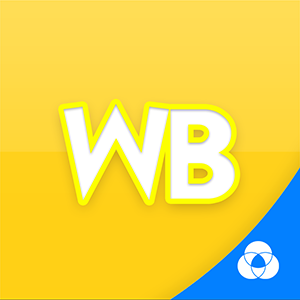Kirjeldus
Word Builder™ is the ultimate phonics teaching tool! It is a scientifically-based, easy to use app that you can use to help children and adults of all ages learn to read and spell.
Created by reading specialist and speech-language pathologist Dr. Bartek Rajkowski, PhD, Word Builder™ is a fun and intuitive means through which to learn how to use letter-sound patterns to crack the code in the English language. It is designed to be used in parallel with any synthetic phonics program (such as Jolly Phonics or MULTILIT).
Word Builder™ is perfect for teaching beginning readers, students with reading difficulties and students learning English as a second language. We are confident that the program will quickly become a favourite tool for anybody with an interest in the teaching of reading and spelling! While the app is designed to be able to be used independently, it is a perfect complement to our other apps.
WHICH SKILLS DOES WORD BUILDER™ HELP WITH? Try reading this word: hippopotomonstrosesquipedaliophobia. How did you read it? Research suggests that we read unfamiliar words by converting letter patterns to speech sounds and then mentally joining the sounds to read the word. Competent readers self-teach by successfully decoding new words, while poor letter-sound knowledge and decoding ability are hallmarks of reading difficulties. This code-cracking skill has been shown through decades of research to be crucial in learning to read and spell. Word Builder™ helps students learn the following code-cracking skills found through research to be vital in learning to read and write in English:
GRAPHEME KNOWLEDGE
Remembering letter-sound relationships. For example, the letter pattern “ay” represents the sound /ay/, like in “play”.
SEGMENTATION
Understanding how to break words up into individual speech sounds. For example, the word “cat” consists of the sounds /k/, /ae/ and /t/.
BLENDING
Being able to join individual speech sounds together to make words. For example, joining the speech sounds /s/.../p/.../oo/.../n/ makes the word /spoon/.
DECODING
Understanding how to read unfamiliar words by using letter-sound relationships. For example, if a student did not recognise the word “flight” when reading, they could say the speech sounds represented by the letter-sound patterns (/f/../l/../igh/../t/) and mentally join the speech sounds to read the word.
ENCODING
Understanding how to spell unfamiliar words by using letter-sound relationships. For example, if a student did not know how to spell the word /play/, they could break the word up into separate speech sounds and spell the word based on letter-sound patterns (“p..l..ay”).
READING AND SPELLING IRREGULAR (TRICKY) WORDS
About 15% of words in English contain unusual or uncommon letter-sound relationships. Many of these words are 'sight words', meaning that they occur frequently in the language. Research suggests that students need to be taught these irregular words explicitly.
WHICH LETTER-SOUND PATTERNS ARE INCLUDED?
Word Builder™ includes letter-sound tiles, adjustable visual mnemonics (memory aids), studio-quality sound recordings and animations of mouth movements for the following core letter-sound patterns in English:
29 Single letter-sounds + "silent / bossy e", for example:
"a" like in "apple" "p" like in "pan" "o" like in "open"
24 vowel letter-sound patterns consisting of 2 or more letters, for example:
"igh" like in "light" "ee" like in "see" "oo" like in "spoon"
15 consonant letter-sound patterns consisting of 2 or more letters, for example:
"sh" like in "ship" "th" like in "mouth" "dge" like in "bridge"
14 "r-controlled" letter-sound patterns consisting of 2 or more letters, for example:
"er" like in "her" "ar" like in "car" "ore" like in "shore"
9 word endings, for example:
"ing" like in "wing" "le" like in "little" "ous" like in "famous"
HOW DO STUDENTS USE WORD BUILDER™ ?
Word Builder™ gives students an easy way to experiment with making and reading words using the most common letter-sound patterns in English. Students tap on letter-sound patterns to hear the speech sounds they represent. Students can make words by combining these patterns. The student moves his or her finger over the patterns in a word to hear the individual speech sounds in the word and see the letter patterns that represent those speech sounds. An animation of a mouth explicitly teaches students about the relationship between speech and written language while strengthening articulatory awareness skills. Letter-sound patterns can be moved and replaced by dragging and dropping them. They can also be deleted. Students can check to see if words they have made are correctly spelled.
HOW DO PARENTS, TEACHERS AND READING SPECIALISTS USE WORD BUILDER™ TO HELP STUDENTS?
You can use Word Builder™ to build words with letter-sound tiles for the student to read, or you can say a word for the student to build. You can change the selection of letter-sound tiles used in activities so that beginning students can practice with the most basic building blocks of written language while more advanced readers can learn less common patterns. You can also save letter-sound tile sets for later use. An in-built memory-aid system helps students to remember letter-sound relationships. Once students begin to remember these relationships, the memory-aid system may be turned off so that students can begin to remember letter-sound patterns by themselves.
Please read our guide to using Word Builder for more information on using the app: http://www.readingdoctor.com.au/word-builder-how-to-use/ PLEASE NOTE:
Although students enjoy using WordBuilder™, it is a serious teaching tool, not a game! It does not read or spell words for students but helps you to teach students to use letter-sound patterns to read and spell words for themselves. Wordbuilder™ is designed to be used in parallel with any synthetic phonics program. If you would like advice about how best to use the app, please contact us!


